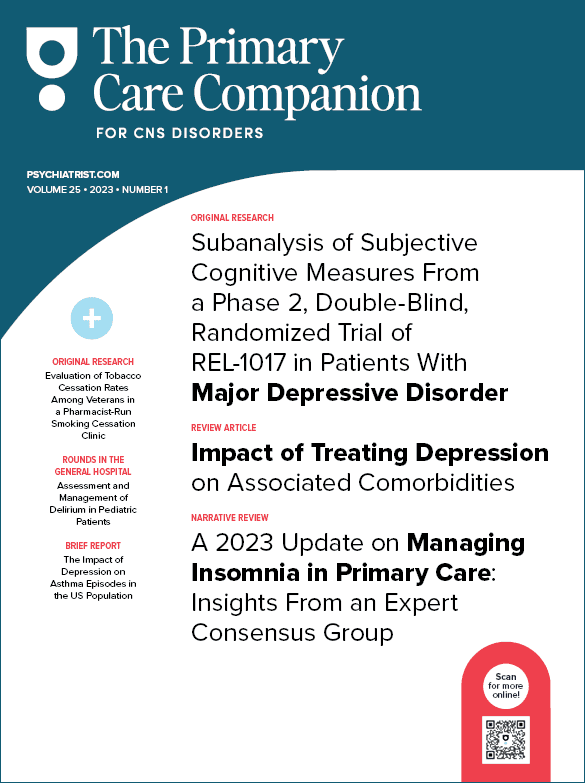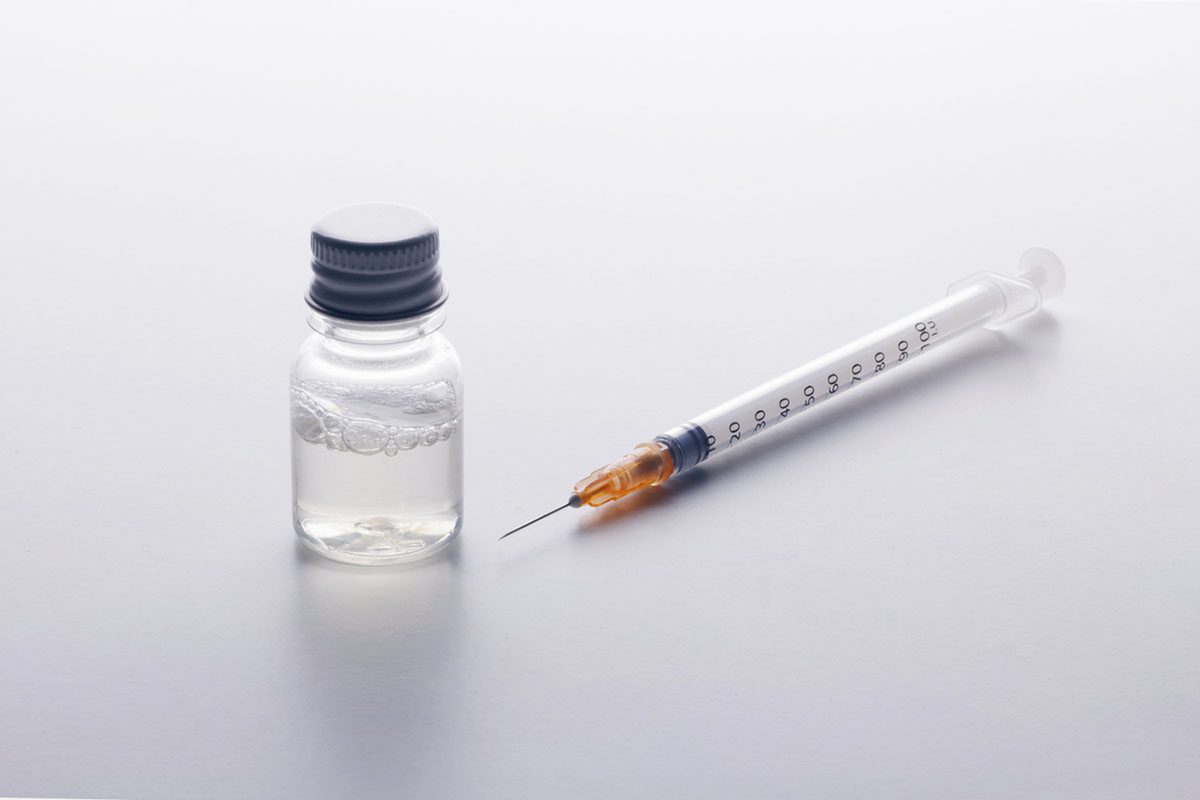See reply by BachuBachu and article by Williams et al
To the Editor: Mal de débarquement syndrome (MdDS) is a chronic illness manifested by a persistent false sensation of nonspinning self-motion, such as rocking, swaying, bobbing, or gravitational pull in a particular direction. The case report by Williams et al1 correctly identifies that MdDS is often complicated by psychiatric comorbidities and that underrecognition of the illness among clinicians poses a significant additive burden on afflicted patients. Pertinently to the latter point, patients are said to make an estimated average of 7–19 visits to health care professionals before their MdDS diagnosis, which can take several frustrating years and cost thousands of dollars for the visits, diagnostic tests, and travel expenses.2,3 Unfortunately however, the authors seem to have overlooked the publication of the expert consensus document on MdDS diagnostic criteria, which predates the case report by 2 years and takes some contrasting positions.4 Critically, the document, as previously noted, states that exposure to passive motion temporarily reduces symptoms of MdDS, which is a rather unique qualifier and diagnostic distinction from persistent postural perceptual dizziness.4–8 The document also states that clinical structural brain imaging is of low yield in the diagnosis of MdDS, as incidental findings are rather common.5,9
The journal readership should also be made aware that the chance of a positive outcome of MdDS has recently significantly improved with the discovery that a central vestibular mechanism, known as velocity storage, may be maladapted in patients with MdDS.10–12 Velocity storage is a major element of the vestibulo-ocular reflex (VOR), underpinned by an interaction between the bilateral vestibular nuclei in the brain stem and the posterior vermal cerebellum.13,14 Activated by head rotation, large-field visual motion, or tactile cues for continuous rotation, this mechanism holds an estimate of head rotational velocity in space, as expressed by nystagmus in response to head rotation or optokinetic stimulation (OKS) or during circular locomotion.15,16 In addition to serving brain stem reflexes with a working memory–like function for self-motion,17 velocity storage is thought to contribute to the illusory sensation of self-motion during OKS,18 as well as the false sensation of self-motion in MdDS. Importantly, a maladapted velocity storage can be corrected by a technique aimed to induce readaptation of the VOR.10 The original approach that combines OKS and an alternating head tilt maneuver has yielded successful outcomes in many patients with MdDS in multiple settings,19–23 and new but related approaches are being developed, including one that uses OKS alone to counter gravitational pull.24
The case report1 mentions that the patient responded well to an OKS therapy, although potentially informative details of this therapy are missing. Also unclear is whether the possibility of reducing or tapering off amitriptyline initially prescribed to the patient was considered at this point. Although data are lacking as to whether a nonmedication treatment such as VOR readaptation or cognitive-behavioral therapy can lead to reduced use of psychoactive medication previously prescribed for comorbid conditions that were exacerbated by MdDS, benefits of such medication should be continually evaluated against risks associated with its long-term use.
Article Information
Published Online: July 11, 2023. https://doi.org/10.4088/PCC.23lr03518
© 2023 Physicians Postgraduate Press, Inc.
Prim Care Companion CNS Disord. 2023;25(4):23lr03518
To Cite: Maruta J, Yakushin SB, Cho C. Creating informed interest in mal de débarquement syndrome. Prim Care Companion CNS Disord. 2023;25(4):23lr03518.
Author Affiliations: Department of Neurology, Icahn School of Medicine at Mount Sinai, New York (Maruta); Department of Rehabilitation and Human Performance, Icahn School of Medicine at Mount Sinai, New York (Maruta); Department of Neurology, Icahn School of Medicine at Mount Sinai, New York (Yakushin); Department of Neurology, NYU Langone Medical Center, New York (Cho); Department of Otolaryngology, NYU Langone Medical Center, New York (Cho).
Corresponding Author: Jun Maruta, PhD, Department of Neurology, Icahn School of Medicine at Mount Sinai, 1 Gustave L. Levy Pl, New York, NY 10029 ([email protected]).
Relevant Financial Relationships: None.
Funding/Support: NIH NIDCD grants R21DC018390 and R01DC019928.
ORCID: Jun Maruta: https/orcid.org/0000-0002-5054-6605
References (24)

- Williams ÖCA, Caraballo-Rivera EJ, Narasimhan S, et al. Mal de debarquement syndrome complicated by psychiatric comorbidities. Prim Care Companion CNS Disord. 2022;24(6):22cr03278. PubMed CrossRef
- Macke A, LePorte A, Clark BC. Social, societal, and economic burden of mal de debarquement syndrome. J Neurol. 2012;259(7):1326–1330. PubMed CrossRef
- Mucci V, Canceri JM, Brown R, et al. Mal de debarquement syndrome: a survey on subtypes, misdiagnoses, onset and associated psychological features. J Neurol. 2018;265(3):486–499. PubMed CrossRef
- Cha YH, Baloh RW, Cho C, et al. Mal de débarquement syndrome diagnostic criteria: consensus document of the Classification Committee of the Bárány Society. J Vestib Res. 2020;30(5):285–293. PubMed CrossRef
- Cha YH, Brodsky J, Ishiyama G, et al. Clinical features and associated syndromes of mal de debarquement. J Neurol. 2008;255(7):1038–1044. PubMed CrossRef
- Cha YH. Mal de debarquement syndrome: new insights. Ann N Y Acad Sci. 2015;1343(1):63–68. PubMed CrossRef
- Ampomah KK, Clark BC, Arnold WD, et al. An uncommon cause of headache and dizziness after cruise travel: case report of mal de debarquement syndrome. J Osteopath Med. 2021;121(5):471–474. PubMed CrossRef
- Van Ombergen A, Van Rompaey V, Maes LK, et al. Mal de debarquement syndrome: a systematic review. J Neurol. 2016;263(5):843–854. PubMed CrossRef
- Vernooij MW, Ikram MA, Tanghe HL, et al. Incidental findings on brain MRI in the general population. N Engl J Med. 2007;357(18):1821–1828. PubMed CrossRef
- Dai M, Cohen B, Smouha E, et al. Readaptation of the vestibulo-ocular reflex relieves the mal de debarquement syndrome. Front Neurol. 2014;5:124. PubMed CrossRef
- Cohen B. Dedication to Mingjia Dai, PhD. for discovery of the first successful treatment of the mal de debarquement syndrome. Front Neurol. 2019;10:1196. PubMed CrossRef
- Dai M, Cohen B, Cho C, et al. Treatment of the mal de debarquement syndrome: a 1-year follow-up. Front Neurol. 2017;8:175. PubMed CrossRef
- Katz E, Vianney de Jong JM, Buettner-Ennever J, et al. Effects of midline medullary lesions on velocity storage and the vestibulo-ocular reflex. Exp Brain Res. 1991;87(3):505–520. PubMed CrossRef
- Waespe W, Cohen B, Raphan T. Dynamic modification of the vestibulo-ocular reflex by the nodulus and uvula. Science. 1985;228(4696):199–202. PubMed CrossRef
- Cohen B, Matsuo V, Raphan T. Quantitative analysis of the velocity characteristics of optokinetic nystagmus and optokinetic after-nystagmus. J Physiol. 1977;270(2):321–344. PubMed CrossRef
- Bles W, de Jong JM, de Wit G. Somatosensory compensation for loss of labyrinthine function. Acta Otolaryngol. 1984;97(3-4):213–221. PubMed CrossRef
- Dai MJ, Raphan T, Cohen B. Spatial orientation of the vestibular system: dependence of optokinetic after-nystagmus on gravity. J Neurophysiol. 1991;66(4):1422–1439. PubMed CrossRef
- Brandt T, Dichgans J, Koenig E. Differential effects of central versus peripheral vision on egocentric and exocentric motion perception. Exp Brain Res. 1973;16(5):476–491. PubMed CrossRef
- Hojnacki M. Treatment of mal de debarquement syndrome in an audiology-vestibular clinic [published online ahead of print November 2, 2022]. J Am Acad Audiol. Nov 2 2022. doi: 10.1055/s-0042-1757769. PubMed CrossRef
- Schenk SM, Wagner JM, Miller JA, et al. Treatment of mal de debarquement syndrome in a deployed environment. Mil Med. 2018;183(11-12):e775–e778. PubMed CrossRef
- Hoppes CW, Vernon M, Morrell RL, et al. Treatment of mal de debarquement syndrome in a computer-assisted rehabilitation environment. Mil Med. 2022;187(7-8):e1011–e1015. PubMed CrossRef
- Yakushin SB, Zink R, Clark BC, et al. Readaptation treatment of mal de debarquement syndrome with a virtual reality app: a pilot study. Front Neurol. 2020;11:814. PubMed CrossRef
- Mucci V, Perkisas T, Jillings SD, et al. Sham-controlled study of optokinetic stimuli as treatment for mal de debarquement syndrome. Front Neurol. 2018;9:887. PubMed CrossRef
- Yakushin SB, Raphan T, Cho C. Treatment of gravitational pulling sensation in patients with mal de debarquement syndrome (MdDS): a model-based approach. Front Integr Nuerosci. 2022;16:801817. PubMed CrossRef
Save
Cite
Advertisement
GAM ID: sidebar-top




